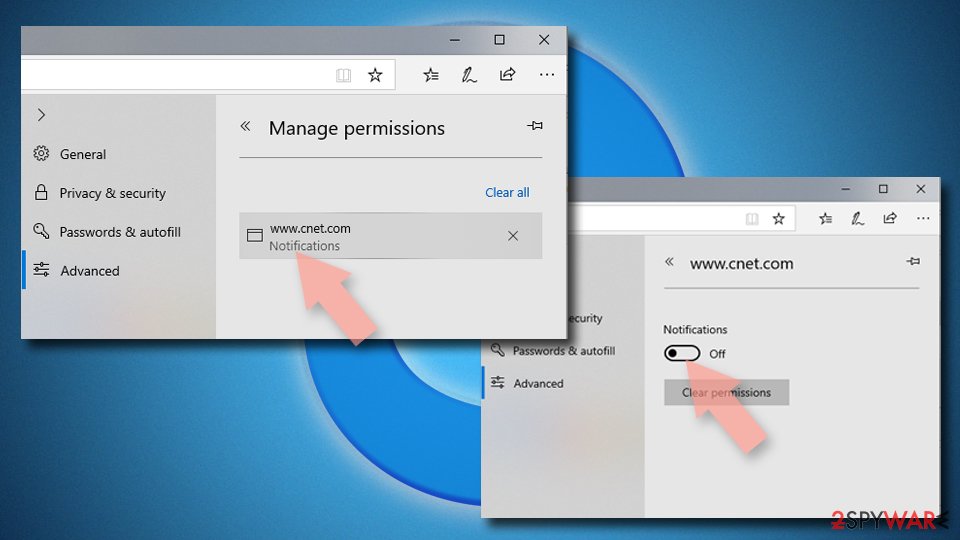Shotvideoalt.ru ads (scam) - Chrome, Firefox, IE, Edge
Shotvideoalt.ru ads Removal Guide
What is Shotvideoalt.ru ads?
Shotvideoalt.ru is a scam website that sends malicious links directly to users' desktops

Ads from Shotvideoalt.ru can show up on the desktop at any time while using the browser for video viewing, gaming, or simply browsing the favorite websites. These intrusive notifications, which show up at the bottom-right or top-right corner of the screen (depending on if Windows or macOS is used), often include incorrect and misleading information about various topics, including PC safety diagnostics get-rich-quick scams, and much more. Likewise, mobile phone or tablet users might also experience exactly the same behavior, even to the worse extent.
This rather unpleasant activity can be observed on all modern browsers (Chrome, Firefox, MS Edge, Safari, etc.), even though it might not initially look it is connected to them. The truth is, there is a reason why Shotvideoalt.ru notifications are showing up on the screen at random times, and that is permission given by users themselves. The key point here is that the approval is usually obtained with the help of social engineering[1] tricks, otherwise known as scams.
The cause of the unwanted push notifications is users pressing the “Allow” button within the notification prompt shown as soon as Shotvideoalt.ru is accessed. In the background, people can see a deceptive message which claims that it should be pressed due to one reason or another. Evidently, the best thing to do after accessing scam websites is to leave them immediately, although this might not be so evident for those less experienced in the IT field.
If you are suffering from the incredible number of ads coming from this website, you should never click the links or the pop-ups themselves, as you might be redirected to other scam sites (for example, CleverCaptcha.top, Ukndaspiratioty.xyz, or Jollycrowds.com) or places where automatic scripts, under certain circumstances, could download and install malware automatically. Follow the steps below to stop the intrusive activity once and for all.
| Name | Shotvideoalt.ru |
|---|---|
| Type | Push notifications, ads, pop-ups, scam |
| Distribution | The pop-ups are triggered by the “Allow” button within the notification prompt on the site |
| Symptoms | Notifications show up at the bottom-right corner of the screen – these include fraudulent content and links to potentially dangerous websites |
| Dangers | Users might suffer from monetary losses, install malware or potentially unwanted programs on their systems, or disclose their sensitive data to cybercrooks |
| REmoval | To stop the intrusive pop-ups, you need to access the settings section of your browser. You should also check your system with SpyHunter 5Combo Cleaner or another security software to eliminate adware and malware |
| Further steps | Make sure you clean your browsers after you delete PUPs from the system. To do that automatically, you can use FortectIntego |
Beware of browser redirects
Redirects, when initiated by a link click, are nothing new and have been one of the core components of web browsing over the years. For example, if one clicks on a link that says “Contact information,” they expect to see content related to this topic. However, there are plenty of links that are deceptive and do something users don't expect – redirect to places they would most likely never visit otherwise, like, for example, Shotvideoalt.ru.
In fact, deceptive links are one of the main components of an online scam. Thanks to the insecure links and automatic redirects, users end up on websites that show all sorts of phishing content, and their passwords get stolen, their banking details leaked, or malware on their devices installed without permission.
To reduce the risk of being redirected to suspicious places online, we would recommend employing effective and legitimate adblockers. While they are great at protecting websites from executing malicious scripts (along with the intrusive ads), they can sometimes break page elements and deny monetization for content creators, so it's not a perfect solution.

Likewise, unexpected redirects are mostly caused by clicking on links embedded on high-risk websites. The main culprits in this category are illegal software download and video streaming websites – they are filled with fake download and registration buttons. Therefore, staying away from such sites can help you stay safe online.
Remove Shotvideoalt.ru pop-ups
Most users who start receiving Shotvideoalt.ru ads seemingly out of nowhere immediately believe that their system is infected. While this could or could not be true, the push notifications themselves are not a part of any malicious software but rather a component of the browser itself, which is commonly used by crooks to deliver potentially dangerous information directly to users.
Therefore, performing a scan with anti-malware would not remove Shotvideoalt.ru pop-ups. That being said, it is important to check your system with SpyHunter 5Combo Cleaner, Malwarebytes, or another security software to ensure that there is no adware or malware installed on it. Frequent browser redirects to suspicious and deceptive websites can be one of the main signs of adware infection. Using FortectIntego or our instructions at the bottom of this post to clean browsers is also a vital step for privacy and security.
To stop the intrusive push notifications, proceed with these steps:
Google Chrome (desktop):
- Open Google Chrome browser and go to Menu > Settings.
- Scroll down and click on Advanced.
- Locate the Privacy and security section and pick Site Settings > Notifications.
- Look at the Allow section and look for a suspicious URL.
- Click the three vertical dots next to it and pick Block. This should remove unwanted notifications from Google Chrome.

Google Chrome (Android):
- Open Google Chrome and tap on Settings (three vertical dots).
- Select Notifications.
- Scroll down to the Sites section.
- Locate the unwanted URL and toggle the button to the left (Off setting).

Mozilla Firefox:
- Open Mozilla Firefox and go to Menu > Options.
- Click on Privacy & Security section.
- Under Permissions, you should be able to see Notifications. Click the Settings button next to it.
- In the Settings – Notification Permissions window, click on the drop-down menu by the URL in question.
- Select Block and then click on Save Changes. This should remove unwanted notifications from Mozilla Firefox.

Safari:
- Click on Safari > Preferences…
- Go to Websites tab and, under General, select Notifications.
- Select the web address in question, click the drop-down menu and select Deny.

MS Edge:
- Open Microsoft Edge, and click the Settings and more button (three horizontal dots) at the top-right of the window.
- Select Settings and then go to Advanced.
- Under Website permissions, pick Manage permissions and select the URL in question.
- Toggle the switch to the left to turn notifications off on Microsoft Edge.

MS Edge (Chromium):
- Open Microsoft Edge, and go to Settings.
- Select Site permissions.
- Go to Notifications on the right.
- Under Allow, you will find the unwanted entry.
- Click on More actions and select Block.

Push notifications: a questionable feature
Push notifications, all things considered, is a relatively new feature in the web browser landscape. Initially, it was created back in 2009 by Apple and was used to deliver system or product-related messages to users. It was only adopted by Chrome in 2015, with other popular browsers following soon after.
During the creation of a website, the developers can pick the option to offer users to receive notifications from the site. As evident, most websites are keen on asking people whether they want this or not, and, without a doubt, it can be useful for both parties. Information users are interested in is shown to them directly, on top of other apps, which makes it much easier to notice. Likewise, it helps website developers grow and make users explore their links more often.
However, the reality is quite a bit different. Users are always free to decline the offer to accept the notifications from any website, and, according to the study done by Mozilla, these prompts remain unaccepted by approximately 99% of visitors, with almost 50% actively blocking the request.[2]
It was also noted by security researchers that the feature was commonly abused by cybercriminals.[3] The request to enable notifications is not as straightforward on Google Chrome especially and can be easily misinterpreted by the visitors. Here is an example of a message you could receive upon accessing the Shotvideoalt.ru site:
Can't play this video!
Perhaps your browser doesn't allow video playback.
Please click the Allow button to watch the video.
There are plenty of other tricks that crooks come up with, including showing a picture of a robot and claiming that the Allow should be pressed in order to bypass captcha verification. These requests should definitely be ignored and, if you accidentally allowed a suspicious website to show you notifications, you can use the instructions in the previous section to remove the permission easily.
How to prevent from getting adware
Access your website securely from any location
When you work on the domain, site, blog, or different project that requires constant management, content creation, or coding, you may need to connect to the server and content management service more often. The best solution for creating a tighter network could be a dedicated/fixed IP address.
If you make your IP address static and set to your device, you can connect to the CMS from any location and do not create any additional issues for the server or network manager that needs to monitor connections and activities. VPN software providers like Private Internet Access can help you with such settings and offer the option to control the online reputation and manage projects easily from any part of the world.
Recover files after data-affecting malware attacks
While much of the data can be accidentally deleted due to various reasons, malware is one of the main culprits that can cause loss of pictures, documents, videos, and other important files. More serious malware infections lead to significant data loss when your documents, system files, and images get encrypted. In particular, ransomware is is a type of malware that focuses on such functions, so your files become useless without an ability to access them.
Even though there is little to no possibility to recover after file-locking threats, some applications have features for data recovery in the system. In some cases, Data Recovery Pro can also help to recover at least some portion of your data after data-locking virus infection or general cyber infection.
- ^ What is Social Engineering?. Webroot. Security solutions.
- ^ M.J. Kelly. Say goodbye to annoying notification requests (unless you want them). Mozilla. Blog.
- ^ Pieter Arntz. Browser push notifications: a feature asking to be abused. Malwarebytes Labs. Official blog post.
